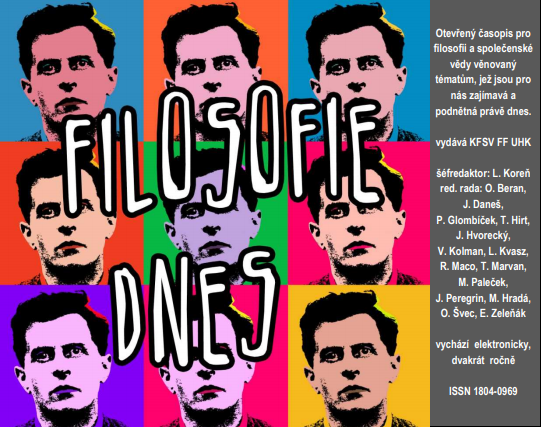Střet kontinentální a analytické filozofie
DOI:
https://doi.org/10.26806/fd.v8i2.221Keywords:
Kontinentální filozofie, Fenomenologie, Analytická filozofie, Pseudověda, Konceptuální analýza, NaturalismusAbstract
Článek se zabývá dějinami střetu mezi analytickou a kontinentální tradicí, který dominoval filozofii 20. století. I když obě tradice vzešly ze stejného intelektuálního prostředí a byly výrazně ovlivněny novokantovstvím, přesto se jejich vzájemné neporozumění postupem času prohlubovalo a při několika příležitostech situace přerostla v otevřené nepřátelství. V článku je popsáno deset nejzávažnějších konfliktů: Russell vs. Bergson, Schlick vs. Husserl, Carnap vs. Heidegger, Ryle vs. Heidegger, Popperova kritika pseudovědy, konference v Royaumont, Searle vs. Derrida, odhalení Heideggerovy nacistické minulosti, Derridův čestný doktorát z Cambridge a Sokalův podvrh. Na počátku 21. století se ukazuje, že rozepře analytické a kontinentální filozofie se vyčerpala. Mnohem podstatnější je spor o samotnou metodologii filozofie, jenž se projevuje v rozhraní mezi naturalisticky a antinaturalisticky zaměřenými mysliteli.
The article focuses on the history of the conflict between analytic and continental tradition, which dominated the philosophy of the 20th century. Although both traditions originated from the same intellectual environment and were heavily influenced by Neo-Kantianism, their mutual lack of understanding progressed over time and, on several occasions, the situation grew into open hostility. The article describes the ten most serious conflicts: Russell vs. Bergson, Schlick vs. Husserl, Carnap vs. Heidegger, Ryle vs. Heidegger, Popper's critique of pseudoscience, conference in Royaumont, Searle vs. Derrida, the revelation of Heidegger's Nazi past, Derrida's Honorary Doctorate from Cambridge, and Sokal's scam. At the beginning of the 21st century it turns out that the conflict between analytic and continental philosophy has been exhausted. What is more substantial is the dispute over the philosophical methodology, which is reflected in the division into naturalistic and anti-naturalistic thinkers.
Downloads
Published
Issue
Section
License
Authors who publish in this journal agree that:
1. Authors retain copyright and guarantee the journal the right of first publishing. All published articles are licensed under the Creative Commons Attribution license, which allows others to share this work under condition that its author and first publishing in this journal was acknowledged.
2. Authors may enter into other agreements for non-exclusive dissemination of work in the version in which it was published in the journal (for example, publishing it in a book), but they have to acknowledge its first publication in this journal.
3. Authors are allowed and encouraged to make their work available online (for example, on their websites) as such a practice may lead to productive exchanges of views as well as earlier and higher citations of published work (See The effect of open access).


